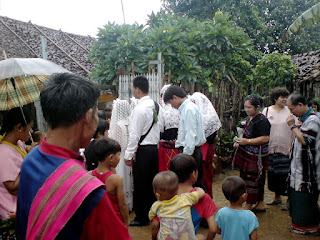Almost an hour and a half away by blood-TEWO (local system of transit = pickup whose rear is arranged in such a way that a dozen people to s 'sit facing each other, on both sides of the vehicle) leads, Emon Sister and I, in refugee camps Mela, near the border with Myanmar.

Sister Emon is part of the Congregation of the Daughters of Charity, whose parent is the Chapel of the Miraculous Medal, Rue du Bac in Paris.
few miles before our arrival point, the blood-TEWO stops, farm workers dressed down in rags. They borrow a trail that leads to the mountain and the river that separates Thailand from Myanmar. Before the vehicle starts to slow down again a little later, at the sight of a checkpoint. Thai soldiers stand in the way, check our papers and we are waved through.
At the entrance of the camp, young people welcome us and offer us unload food that Sister Emon took them with her.

We pass a gate and barbed wire are embarking on a muddy trail. Our offerings have led us up to the chapel, or is preparing to celebrate a wedding katchean (name of a mountain tribe). We are invited and parishioners are eager to introduce ourselves chairs or we can sit down.
Some approach us, amused by the color of my skin. We greet us shaking hands, unlike a Thai who bow in front of each other, hands clasped. Some speak English, and we can exchange a few words.
assistance comes from various tribes driven from their villages in the mountains by the Burmese army: kaya, katchean, Karen and others.
Ceremony begins (in Burmese language most commonly spoken in the camp).
the bride and groom are side by side, behind the altar. She held katchean traditional, embroidered red skirt and black top covered with silverware on the throat. It is being
al'européenne.
During the celebration, she hands him a silver sword, a symbol of strength, and a traditional bag, which he wears slung, representing the riches to come.

0 comments:
Post a Comment